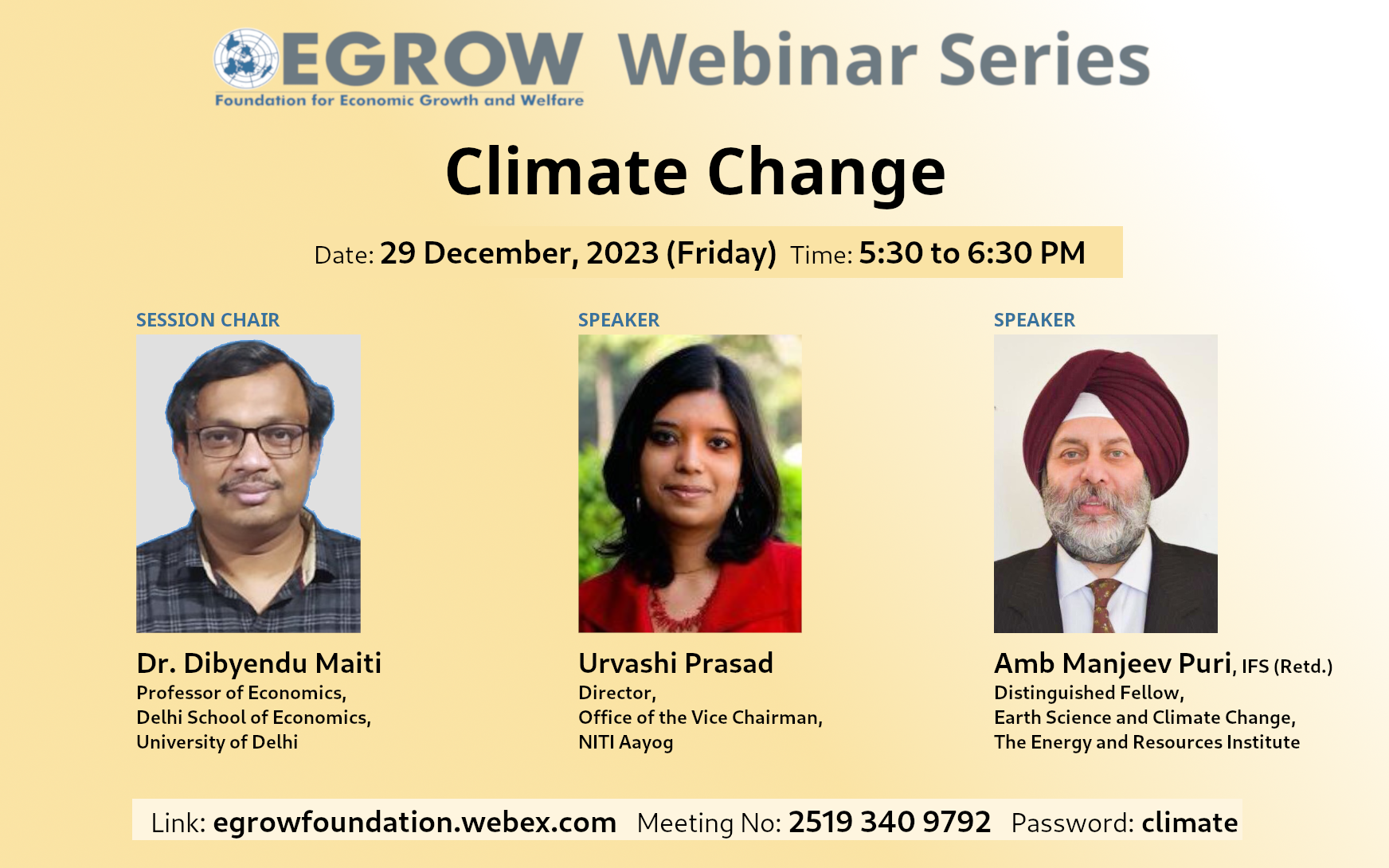Climate Change

Webinar Link
Meeting No: 2519 340 9792
Password: climate
Certificate of Participants
To recieve certificates, please register and attend
Abstract
Climate change and air pollution are caused by a range of natural phenomena. The situation is further compounded by human beings who are leading increasingly resource-intensive lifestyles. Climate change is a major threat to public health. Our health systems are already under pressure, and they are being further crippled by a rise in the incidence of heat waves, floods, droughts, and other vagaries of nature. It is the poor and developing countries that are bearing the highest brunt of climate change.
In the recent past, the severity of the situation and therefore the need for urgent measures have gained traction within the political and policy spheres in the country.
In this backdrop the speaker reviews the global best practices along with their applicability to the Indian context, as well as initiatives that have been taken in India with respect to mitigating climate change and air pollution. Based on this, some recommendations are also made for tackling this growing public health emergency and protecting the well-being of the current and future generations.
About the Speakers
Dr Dibyendu Maiti
Dr Dibyendu Maiti is a Professor of Economics at the Delhi School of Economics, University of Delhi, India. He specialises in development macroeconomics and international economics, focusing on labour, technology, and the informal sector. Before this, he worked at the University of the South Pacific, Institute of Economic Growth Delhi, Centre for Studies in Social Sciences Calcutta as well as held various research positions at the University of Manchester, University of Nottingham, Max Planck Institute of Economics (Jena), Norwegian Institute of International Affairs, University of Oslo. He received the Max-Planck India Fellowship, ICSSR-ESRC exchange and ICSSR-CASS exchange fellowship. He publishes research articles in reputed journals, like Journal of Development Economics, Social Research Indicators, Journal of Productivity Analysis, Labour Economics, Economic Modelling, International Review of Economics and Finance, Cambridge Journal of Economics, American Behavioural Scientists etc. Recently, he published a book named Digitalisation and Development – India and beyond. He is an associate editor of Progress in Development Studies (Sage). He received the IDRC Young India Social Sciences Award, 2010 and Global Development Network Award, 2009.
Urvashi Prasad
Urvashi Prasad is Director in the Office of the Vice Chairman, NITI Aayog, the Indian government's premier policy think tank. Urvashi co-authored India’s first Voluntary National Review presented at the United Nation’s High-Level Political Forum on Sustainable Development in 2017. She has over 150 publications to her credit. Urvashi was recognized as one of 75 Indian achievers at the UK parliament on the occasion of 75 years of India's independence. She has also been recognized as one of the 25 most influential women in healthcare and 100 most influential women in India in 2023. Urvashi is a member of the World Economic Forum’s Expert Network.
Urvashi completed a BSc in Life Sciences (Genetics) from University of Birmingham, UK, followed by an MPhil in Bioscience Enterprise from University of Cambridge and an MSc in Public Health from the London School of Hygiene & Tropical Medicine.
Amb Manjeev Puri
Manjeev Singh Puri is a Distinguished Fellow and on the Advisory Board of TERI. He joined the Indian Foreign Service in 1982 and has served as Ambassador of India to the European Union, Belgium, Luxembourg, Nepal and as Ambassador/Deputy Permanent Representative of India to the UN. In addition, he has served twice in Germany (in Bonn and Berlin), in Cape Town, Muscat, Bangkok and Caracas. From 2005 to 2009, he headed the UN-Economic & Social Affairs- Division in the Ministry of External Affairs of India and led the Indian delegation for the first meeting of the Global Forum on Migration and Development in Brussels in July 2007 and the presentation of various reports by India at the Human Rights Council. During 2011-2012, when India served on the Security Council, he was a senior member of its delegation.
Major areas of his experience and professional focus relate to the environment, in particular climate change and sustainable development. He was a lead negotiator for India at the UN on issues relating to the post 2015 development agenda, Sustainable Development Goals and at the UN Conference on Sustainable Development held in Rio de Janeiro, Brazil in June 2012. He was a key member of India's delegation at various Climate Change negotiations, including the Conference of Parties of the UNFCCC in Copenhagen in December 2009 and before that at Montreal, Bali, Bonn and Poznan. Furthermore, he was closely involved with India's participation in the G8-G5 Summits from 2005 and he was the points-person on the Indian side at the Major Economies Forum.
Puri has a Masters degree in Management and did his BA (Honours) in Economics from St. Stephen’s College, Delhi.